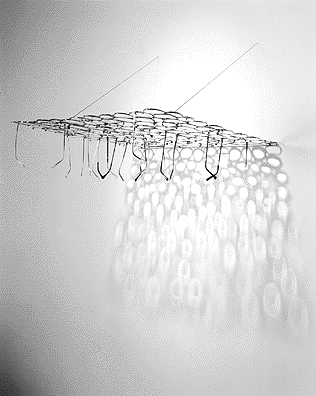|
Richard Klein | |
Traditionally, an artist's interests and education were humanities based, aligned with the literary intelligentsia — Freud, Hegel, Heidegger, etc. But my intellectual interests grew out of the scientific tradition, which I believe provides the most significant and relevant mythology of our time. The intellectual establishment until recently has marginalized science, particularly visionary speculation. Growing up, I was told in no uncertain terms that Jules Verne and H.G. Wells were second-rate writers. In the 1970's I discovered Colin Wilson, Doris Lessing, and J.G. Ballard whose ideas, combined with my new- found interest in surrealism, fueled my first serious art making. And like Shelley's character, Victor Frankenstein, I grew to believe that when I combine found objects correctly, the result is greater than the sum of the parts. I also came to understand the consequences of imagination; that creation itself leads to a profound restlessness of spirit. The eyeglasses I collect are used — some were worn by an individual for a brief period, others for a significant portion of a lifetime. They have the unique property, which they share with other glass objects, of being an intermediary of separation and protection, while simultaneously giving us greater intimacy with certain experience. Glass is a metaphor for our complicated relationship with both experience and history; we perceive so much through glass — darkly or otherwise. Eyeglasses were the first prosthesis to utilize the empiricism of science. The word spectacle is derived from the Latin specere, to see, which is also the root of spectrum (specter: an apparition), and speculate, to indulge in conjectural thought or reflection. Assembling the eyeglass lenses together I create a "meta-lens," perhaps refracting some sense of our collective experience. I stare into the projected patterns searching for fragments of a narrative, hoping to catch a glimpse of someone else's pleasure or anxiety.
|
copyright ©1996-7 NEW OBSERVATIONS Ltd., and the authors. All Rights Reserved
